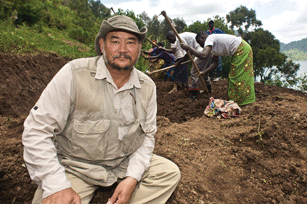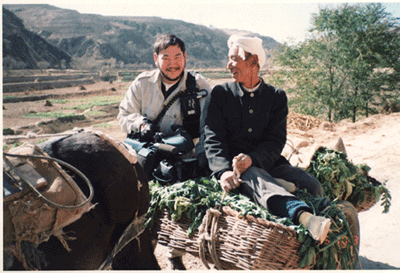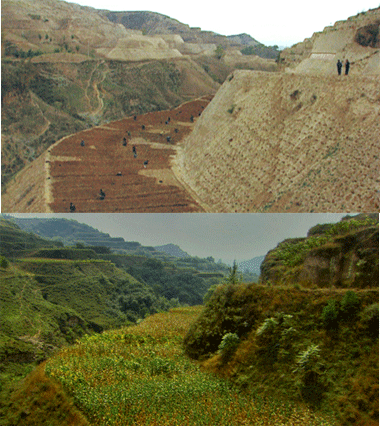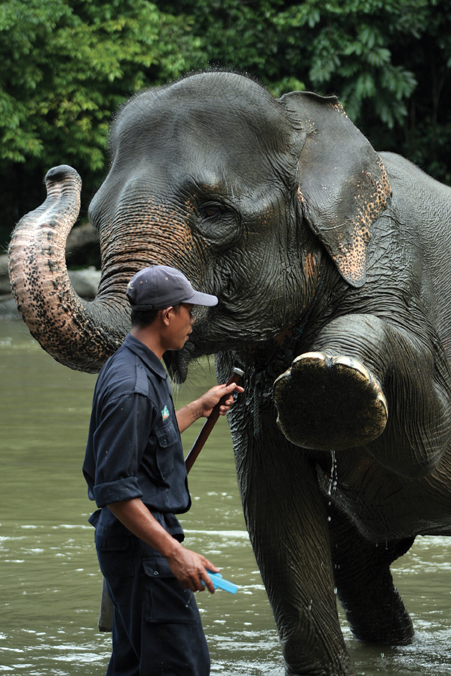Published: 2010
Empowering vision
Cynthia Karena
Educational filmmaker and sustainability advocate, John Liu, has a knack for effectively communicating the complex in ways that make people sit up and take notice. A key to his success is leveraging the power of the image to inspire hope and a commitment to action.

|
|
John Liu in Rwanda – Hope in a Changing Climate documents local communities and government working together to rejuvenate the land. Credit: John Liu
|
John D Liu’s mission is to make it easy for people to understand climate change.
‘The issue is knowledge. For either the public or for policy makers, ignorance is a good excuse,’ says Mr Liu, founder of the Environmental Education Media Project (EEMP), which produces audiovisual environmental education materials for broadcast and educational audiences.
For more than ten years, the project has been documenting best-practice methods for large-scale restoration of damaged or destroyed ecosystems.
‘If (people) don’t know what to do, they are unlikely to be able to do much,’ says Mr Liu. ‘But if we know that it is possible to rehabilitate large-scale degraded ecosystems and we don’t do it, then we have crossed a line, because our knowledge is responsibility.’
An American with a Chinese father and an American mother, Mr Liu has lived in China for more than 30 years. He trained as a journalist in the United States, and moved to China to help open the CBS News Bureau in Beijing in 1979.
After a decade of living in China, Mr Liu became concerned about the levels of pollution and the rapid pace of development.
With his ‘knowledge brings responsibility’ philosophy, he founded the Environmental Education Media Project for China (the precursor to EEMP) and has been engaged in researching, documenting and educating people about ecology ever since. As an environmental filmmaker and ecological field researcher, he has produced and directed documentaries for CBS, National Geographic and the BBC.

|
|
John Liu on location in the 1990s, soon after establishing his environmental education media project. Credit: John Liu
|
In 2006, Mr Liu was named the Rothamsted International Fellow for the Communication of Science. Rothamsted – a non-profit organisation working towards sustainable agriculture in developing and emerging countries – supports his PhD work with the Soil Sciences Department at the University of Reading in the United Kingdom.
Mr Liu is also a member of the Steering Committee of the Global Forum on Media for Development, and an Associate Professor at George Mason University’s Center for Climate and Society in the US.
Stories of hope
Mr Liu says most policy makers and the public assume that the human impact on climate is limited to the copious emissions of carbon dioxide and other greenhouse gases generated by fossil fuel combustion over the past century or so.
‘The problem with this is that it is only partially true,’ he says. ‘Human impact on the climate began long before egregious emissions of CO2 and other greenhouse gases, when human beings began to reduce biodiversity, biomass and accumulated organic matter. These impacts are exacerbated by egregious emissions.’
Re-balancing the world’s carbon equilibrium, according to Mr Liu, is not just a matter of reducing carbon dioxide emissions.
‘If we restore all degraded land on the entire planet as well as reduce emissions, you can extrapolate massive carbon uptake, [as well as] re-regulated hydrological flows, increased fertility and productivity, and the ability to ensure that the highest level of genetic diversity possible survives into future generations,’ he says. ‘That seems like a much more comprehensive result.’
EEMP’s most recent documentary is Hope in a Changing Climate, filmed on location in China, Ethiopia and Rwanda.1 The film aims to demonstrate that damaged ecosystems and degraded land can be restored to health, and that such an outcome economically improves the lives of local people.
The segment on China’s Loess Plateau proves the point, with location footage showing how a barren, brown landscape covering an area the size of Belgium was transformed into a functioning, green ecosystem where rainfall infiltrates, water is retained and crops are readied for export. Importantly, this has enabled local communities to prosper.
Hope ... also interviews world leaders, bankers, students, presidents, journalists, scientists and local people. According to the film’s website, the Government of Rwanda has adopted a new national land-use policy based on EEMP’s presentations and analysis.
The film aired on BBC World last year, and screenings were held for world leaders at the Copenhagen climate change summit.
Reversing the damage
Degraded farmland in developing countries may be one of the best opportunities we have to reverse the trend toward reduced ecological function, says Mr Liu.
‘What human beings have done historically to damage the environment can be understood rather simply. We have interrupted evolutionary trends. This has resulted in reducing biodiversity, which has caused a reduction in biomass, which has in turn caused a reduction in the accumulation of organic matter. These changes have caused disruptions to fundamental systems that all life relies on.

|
|
John Liu’s documentation of the transformation of China’s Loess Plateau from barren landscape (top) to fertile oasis (bottom) has inspired communities in other ecologically damaged areas. Credit: John Liu
|
‘Through our ignorance, we have reduced gas exchange through photosynthesis, lowered nutrient recycling through the decay and transformation of each generation of life, and massively disrupted the infiltration and retention of rainfall in the biomass and in the soils.
‘If we return vegetation to degraded landscapes we can sequester large amounts of carbon from the atmosphere. This is done through photosynthesis. If we return vegetation, we also can lower temperatures because of shade, and we can increase soil moisture and relative humidity by restoring microclimates below vegetated canopies.
‘The Global Partnership for Forest Landscape Restoration has roughly estimated that one billion hectares of the Earth have been degraded and could be restored. This represents a huge potential, through understanding and positive work, to improve what is now a quite bad situation.’
Urban responsibility
The principles of conserving biodiversity and utilising biomass and accumulated organic matter are not just applicable to rural areas, says Mr Liu.
He sees the Earth as made up of five different landscape types; urban landscapes, pristine or functional landscapes, agricultural landscapes, industrial landscapes and large degraded landscapes.
‘In urban and industrial areas we have in many cases created “dead zones” without any biology. This is not true of all cities. In great cities [such as] London, Beijing, Tokyo, Paris and New York, there are lovely parks, but the buildings, the streets, the parking lots, the factories and businesses are mostly not designed to include these principles.’
Mr Liu says that if you lower biodiversity, biomass and organic matter, you get elevated temperatures. Another impact of losing biomass and organic matter to impervious ground cover such as pavement is the loss of capacity to retain and infiltrate rainfall. This results in flooding during rainy seasons. Further, water that would have been captured by living plants and roots during rains is not available to an ecosystem during the dry season.
‘If we understand these principles, and design our cities, our transportation systems and our buildings around them, then we will have a very different, a very liveable and a sustainable future,’ he says.
‘If we continue to fail to learn this, then I think we are in for very serious problems very soon.’
Not ‘them’ – just ‘us’
|
|
Australia’s pollution has little impact on the world compared with China or India, which may lead some Australians to feel complacent about the environment. However, this type of thinking suggests an ‘us’ and ‘them’ approach, says John Liu. |
‘From my perspective there is just “us”. Humanity is a species. We need to have a species response now to our problems, not suggest that this is “their problem”. It is our problem because we are affecting global systems,’ he says. |
Mr Liu gives the example of persistent organic pollutants. These human-made substances travel all over the world and accumulate up the food chain, but the highest concentrations can be found in Inuit peoples who are thousands of miles from any source. |
‘Pollution somewhere is pollution everywhere,’ he says. ‘There is no them. Just us.’ |
|
More information
1 hopeinachangingclimate.org/the-story







